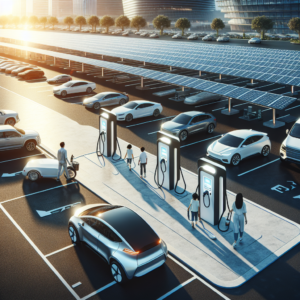Unprecedented Surge in Used EV Sales: A Shocking Shift in the Market
[caption id="attachment_32014" align="alignnone" width="630"] Car Parking Lot - New Electric Vehicle[/caption]
In recent months, the automotive industry has witnessed an unprecedented surge in the sales of used electric vehicles (EVs), marking a significant shift in consumer behavior and market dynamics. This remarkable trend is not merely a fleeting phenomenon; it is indicative of broader economic, environmental, and technological changes that are reshaping the landscape of personal transportation. As more consumers opt for pre-owned electric vehicles, various factors contribute to this transformation, prompting stakeholders to reassess their strategies and expectations for the future.
Understanding the Factors Behind the Unprecedented Surge in Used EV Sales
The surge in used EV sales can be attributed to a confluence of factors that have converged in recent months. First and foremost, the increasing awareness of climate change and the urgent need for sustainable transportation solutions have prompted consumers to consider electric vehicles as a viable alternative to traditional gasoline-powered cars. Additionally, advancements in battery technology have improved the longevity and performance of used EVs, making them more appealing to buyers. Furthermore, the growing availability of used EV inventory, driven by the influx of new electric models entering the market, has provided consumers with a wider selection of options. This combination of environmental consciousness, technological advancements, and increased availability has created a fertile ground for the used EV market to flourish.
Analyzing the Impact of Economic Conditions on Used Electric Vehicle Demand
Economic conditions play a pivotal role in shaping consumer purchasing decisions, and the current economic climate has significantly influenced the demand for used electric vehicles. Rising fuel prices, coupled with inflationary pressures, have led many consumers to seek cost-effective alternatives to traditional vehicles. Used EVs, often priced lower than their new counterparts, present an attractive option for budget-conscious buyers. Additionally, the economic uncertainty stemming from global events has prompted consumers to prioritize long-term savings, making the lower operating costs associated with electric vehicles even more appealing. As economic conditions continue to evolve, the demand for used EVs is likely to remain strong, driven by the desire for affordability and sustainability.
The Role of Government Incentives in Shaping the Used EV Market Landscape
Government incentives have emerged as a crucial factor in the growth of the used EV market. Various federal and state programs aimed at promoting electric vehicle adoption have not only incentivized the purchase of new EVs but have also extended benefits to used electric vehicles. Tax credits, rebates, and grants for used EV buyers have made these vehicles more financially accessible, encouraging consumers to consider pre-owned options. Furthermore, initiatives aimed at expanding charging infrastructure and promoting sustainable transportation have bolstered consumer confidence in the viability of used EVs. As governments continue to prioritize environmental sustainability, the role of incentives in shaping the used EV market is expected to grow, further driving sales and adoption.
Consumer Preferences: Why Buyers Are Turning to Pre-Owned Electric Vehicles
Consumer preferences are shifting dramatically, with many buyers increasingly favoring pre-owned electric vehicles over traditional gasoline-powered options. The appeal of used EVs lies not only in their lower price points but also in the growing recognition of their environmental benefits. Buyers are becoming more conscious of their carbon footprints and are actively seeking ways to reduce their impact on the planet. Additionally, the perception of electric vehicles as technologically advanced and innovative has attracted a diverse demographic of consumers, from eco-conscious millennials to budget-savvy families. The combination of affordability, environmental awareness, and technological appeal has made used EVs an attractive choice for a wide range of buyers.
Challenges and Opportunities for Dealerships in the Used EV Market Boom
As the used EV market experiences a boom, dealerships face both challenges and opportunities in adapting to this evolving landscape. One of the primary challenges is the need for specialized knowledge and training to effectively sell electric vehicles, as many traditional dealerships may lack expertise in this area. Additionally, the rapid pace of technological advancements in EVs necessitates ongoing education for sales staff to address consumer inquiries confidently. However, this challenge also presents an opportunity for dealerships to differentiate themselves by becoming trusted sources of information and expertise in the used EV market. By investing in training and expanding their inventory of used electric vehicles, dealerships can position themselves to capitalize on the growing demand and establish a competitive edge.
Future Projections: What the Surge in Used EV Sales Means for the Automotive Industry
The unprecedented surge in used EV sales signals a transformative shift in the automotive industry that is likely to have lasting implications. As consumer preferences continue to evolve and the demand for sustainable transportation solutions grows, automakers will need to adapt their strategies to align with this new reality. The increased focus on used EVs may lead to a more robust secondary market, prompting manufacturers to consider the lifecycle of their vehicles and the importance of resale value. Additionally, as more consumers embrace electric vehicles, the industry may witness a decline in traditional vehicle sales, necessitating a reevaluation of production and marketing strategies. Ultimately, the rise of used EV sales represents not just a trend but a fundamental change in the automotive landscape, with far-reaching consequences for manufacturers, dealerships, and consumers alike.
The surge in used electric vehicle sales marks a significant turning point in the automotive industry, driven by a combination of economic factors, government incentives, and shifting consumer preferences. As the market continues to evolve, stakeholders must remain agile and responsive to the changing landscape. The implications of this trend extend beyond mere sales figures; they reflect a broader societal shift towards sustainability and innovation in transportation. As we look to the future, the used EV market is poised to play a critical role in shaping the automotive industry's trajectory, offering both challenges and opportunities for all involved.
